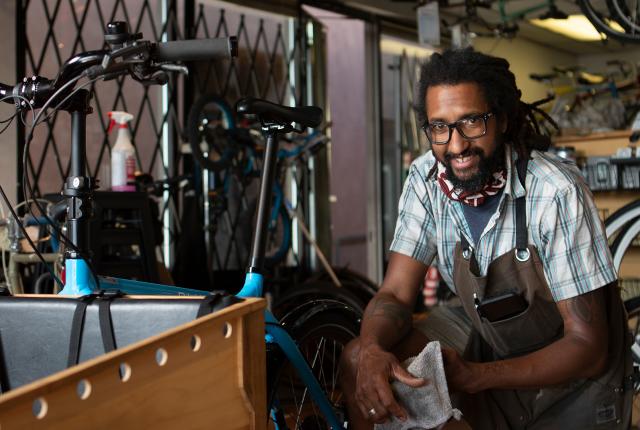Above: Clemente McFarlane's first love was skateboarding. "My first bike was a way to strap my skateboard to my backpack and ride somewhere instead of taking the subway," he says. Photograph by Kate Russell.
CLEMENTE MCFARLANE ANSWERS QUESTIONS WHILE on the 10-minute bike trek from his Santa Fe home to Sirius Cycles. The Rodeo Plaza bike shop he founded in 2012 has been especially busy during the Covid-19 pandemic, leaving little time for the scenic route to work. A native of Panama who grew up in the Canal Zone, McFarlane initially loved skateboarding. He bought his first bike after moving to Boston and taking a job as a messenger. After coming to New Mexico, he worked in a few shops before striking out on his own. Yet the 44-year-old’s interests go deeper than sprockets and brakes. In 2004 he cofounded Chainbreaker Collective, which runs a Bike Resource Center program and advocates for access to affordable transportation. Bikes, for McFarlane, represent an intersection of issues of economic development, social justice, and the environment.
Everybody had a skateboard. We escaped the borders of the Canal Zone to go see the city. As kids, we were like, “Let’s try to get in trouble.” We would venture farther and farther into places.
I would hang out at the gas station and watch the guy changing tires, looking under the car on the lifts. I thought it was cool. We would fix our little remote-control cars, skate ramps, rails, and things.
My first bike was a way to strap my skateboard to my backpack and ride somewhere instead of taking the subway.
When I moved to Santa Fe, I used the bike to explore, because I had no car.
My first 100 miles was a mental breakthrough. That was a huge number. Fifty miles was doable—ride to Madrid and back—but to do two of those?
Then I rode the Santa Fe Century. Once I completed that, I was like, Well, I can do a lot more than what I thought. I can go to school. I can ride to Albuquerque. I can do Chainbreakers.
I studied engineering. I did a feasibility study on a fictional bike shop in Rodeo Plaza.
Leading up to my wedding, a bike shop closed. I purchased all the stuff because in the back of my head I’m like, One day I’m gonna have my own shop.
When my wife got pregnant, I stopped school to become a father. Because I had already done that project, it seemed like it was a little bit closer to reality.
I’m not an activist. I don’t use the word. I just do.
Chainbreakers was a place to build things outside of bike shop hours. In the beginning, we were building bikes and selling them to earn money. It was literally a shack we built, insulated with a rug.
I learned a lot there in terms of organizing and seeing a problem and figuring out a solution to these grander problems.
I bought a car in 2010. When I took my driver’s license exam, I originally failed it because I was approaching it from a cyclist’s point of view.
Lube your chain. When I hear a squeaky chain going by, I feel like saying, “Wait a second, I’ll fix that for you.”
In Panama, there weren’t “cargo bikes.” It was just what you used to haul coconuts, yuca, bananas, yourself, snow cones. Two wheels on front, one in the back, with a huge basket or crate.
When I first saw them here, I wanted to have one and see what it was like—perhaps to relive some of these memories. Instead of using a car, how else could I load up a bike to transport items? I can take my daughter places, go grocery shopping, or do product runs for the shop.
I want to see the City of Santa Fe use cargo bikes, or light electric vehicles, for mail or trash pickup. In two years, I want just one city vehicle to be a cargo bike. If other people see it, it can be a model. Then, I think, we’re going to start watching more protected bike lanes created, and cargo bike parking.

SEE FOR YOURSELF
Sirius Cycles offers custom and brand-name bikes and repairs. 2801 Rodeo Road, Santa Fe, 505-819-7311, on Facebook (@SiriusCycles)


